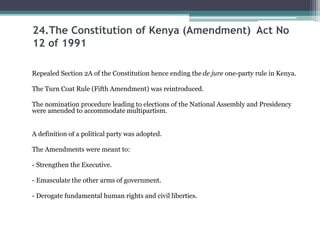Multipartism refers to a political system where multiple political parties are allowed to exist, compete, and take part in the democratic process. The inception of multipartism in Kenya in 1991 marked the transition from a one-party system since Kenya attained its independence in 1963, to a multi-party system in the country’s political landscape.
In Kenya’s context, multipartism refers to the opening up of the political space to allow the formation and recognition of political parties other than the dominant ruling party. It signifies the freedom of association, expression, and the right of citizens to join and support political organizations of their choice.
The push for multipartism in Kenya started in the early 1990s as a response to internal and external pressures for political liberalization and democratization. By then, Kenya operated under a single-party system, with the Kenya African National Union (KANU) as the only legally recognized political party. However, this system was seen as stifling political competition, limiting political freedoms, and consolidating power within the ruling party.
To address these concerns, the then President Daniel Arap Moi, announced in December 1991 that Kenya would transition to a multi-party system. This decision was accompanied by the repeal of Section 2A of the Kenyan Constitution, which declared Kenya a one-party state. This move allowed the formation of new political parties and provided an opportunity for opposition groups to participate in the political process.
With multipartism, Kenyans were allowed to form and join political parties of their choice, elect their representatives, and have a diverse range of political options to support. Multipartism brought about increased political competition, open debates, and a broader representation of different political ideologies and interests.
The inception of multipartism in Kenya was a significant milestone in the country’s democratic journey. It provided a platform for citizens to express their political preferences and hold their leaders accountable through competitive elections and a multiplicity of voices in the political space. This laid the groundwork for a more inclusive and pluralistic political system in Kenya.



Factors which fueled multipartism in Kenya in early 1990s
I like it
I like the article